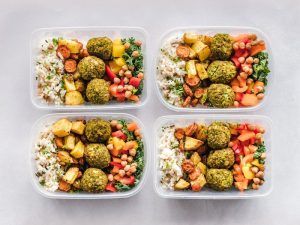Stress-Free Meal Planning
Meal planning can often feel like a chore. But it doesn’t have to be! With the right approach and a bit of organization, meal planning can be a delightful journey that not only saves you time but also reduces stress and promotes healthier eating habits. Let’s explore the art of stress-free meal planning and offer tips and tricks to make it an enjoyable and sustainable part of your routine.
 Why Meal Planning Matters
Why Meal Planning Matters
Before diving into the tips, let’s discuss why meal planning is essential:
- Time-Saver: Meal planning saves you time during the week. When you know what’s for dinner, you’re less likely to waste time figuring it out or making last-minute grocery store trips.
- Healthier Choices: Planning meals allows you to make better food choices. You’re less likely to opt for fast food or unhealthy takeout when you have a nutritious, home-cooked meal ready to go.
- Money Saver: Meal planning can also help you save money. You can make a shopping list, buy ingredients in bulk, and reduce food waste.
- Reduced Stress: Knowing what’s on the menu each day reduces daily decision-making stress. Plus, cooking can be a therapeutic, creative outlet for stress relief.
Stress-Free Meal Planning Tips
Now, let’s explore the practical side of meal planning:
- Set Realistic Goals: Start by setting realistic meal planning goals. You don’t have to plan every single meal for the week if that’s overwhelming. Begin with planning just a few dinners or lunches to ease into the process.
- Create a Master Recipe List: Compile a list of your favorite recipes. These are your go-to dishes that are easy to prepare and loved by the family. Keep this list for reference when planning your weekly meals.
- Choose a Planning Day: Designate a specific day of the week for meal planning. It could be a quiet Sunday morning or a relaxing Friday evening. Consistency will make meal planning feel less like a chore and more like a routine.
- Plan Around Your Schedule: Consider your weekly schedule when planning meals. On busy days, opt for quick and easy recipes. On days with more free time, try more elaborate dishes or experiment with new recipes.
- Keep a Well-Stocked Pantry: A well-stocked pantry is a meal planner’s best friend. Ensure you have essential staples like pasta, rice, canned beans, canned tomatoes, spices, and condiments. This makes it easier to whip up a meal with what you have on hand.
- Plan Leftovers: Don’t forget to plan for leftovers. Cooking larger portions can save you time and effort on busy days when you can simply reheat a delicious meal.
- Shop with a List: Once your meals are planned, create a shopping list. Stick to your list at the grocery store to avoid impulse purchases and reduce food waste.
- Prep Ahead: Spend some time prepping ingredients on your planning day. Chop vegetables, marinate proteins, or prepare sauces. This will make cooking during the week faster and more enjoyable.
- Embrace Theme Nights: Theme nights can add a fun twist to meal planning. For example, you can have Taco Tuesday, Pasta Thursday, or Meatless Monday. These themes simplify decision-making and create a sense of anticipation.
- Make Use of Convenience Foods: Don’t hesitate to use convenient shortcuts like pre-chopped veggies, frozen vegetables, or rotisserie chicken. These can save you time without compromising on taste or nutrition.
- Be Flexible: Meal planning doesn’t have to be rigid. Allow for some flexibility in your plan. Life happens, and there may be days when you want to switch meals or dine out.
- Share the Responsibility: If you live with family or roommates, consider sharing the meal planning responsibilities. You can take turns planning and cooking, making the process less daunting.
- Experiment and Explore: Don’t be afraid to explore new cuisines or ingredients. Experimenting with different recipes and flavors can make meal planning exciting and help you discover new favorites.
- Invest in Tools: Invest in helpful meal planning tools like a magnetic meal planner pad, a shopping list app, or a kitchen timer. These tools can make the process more efficient and enjoyable.
- Reward Yourself: Lastly, reward yourself for successful meal planning. Whether it’s with a favorite dessert, a movie night, or a small treat, acknowledging your accomplishment can make meal planning feel even more satisfying.
Stress-free meal planning is a valuable skill that can simplify your life and promote healthier eating habits. By setting realistic goals, creating a master recipe list, and planning around your schedule, you can make the process enjoyable and sustainable. Keep a well-stocked pantry, prep ahead, and embrace theme nights to add excitement to your meals. Remember, flexibility is key, and it’s okay to occasionally dine out or switch meals as needed. And most importantly, reward yourself for your efforts.









